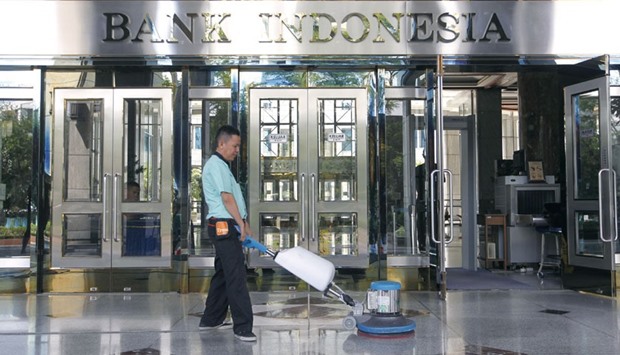The cut, announced hours after a gun and bomb attack in central Jakarta left at least six dead, might kick off policy easing in much of Asia this year as authorities look to both monetary and fiscal stimulus to counter slumping global demand and battered commodity prices.
The last time Indonesia’s key rate was changed was in February, when it was reduced 25 basis points to 7.50%.
Yesterday’s move “is unlikely a one-and-done rate cut,” said Euben Paracuelles, Nomura economist in Singapore. “I would expect them to follow up with another one relatively quickly, probably within Q1.”
Juda Agung, a Bank Indonesia (BI) executive director, said its policy “will be measured from month to month. We assess inflation, growth, global economy, commodity prices.”
Yesterday, BI cut the benchmark policy rate by 25 basis points to 7.25%. The last time it was changed was February, when reduced by 25 basis points to 7.50%.
While BI’s board was holding its first policy meeting of 2016, there were explosions and gunfire less than two kilometres away.
Agung said that after the attacks, which weakened the rupiah, calm returned to Indonesian markets.
The rupiah started yesterday weaker and extended losses to 1% and a one-week low of 13,960 per dollar after the attacks.
The currency pared losses, tracking recovery in other Asian currencies on sharp gains in China’s stocks. It briefly turned firmer, but failed to maintain the rebound and fell 0.6% to 13,905.
At meetings since October, BI said it saw more room to loosen policy, but didn’t cut its benchmark ahead of the first US rate hike in nearly a decade. BI was concerned lower domestic rates could spark capital outflows and weaken the rupiah.
In 2015, the rupiah was Asia’s second-worst currency, falling by 10% against the dollar and touching 17-year lows.
But in the fourth-quarter, it was best performer with a 6.2% jump. It has not been as badly hit as many currencies by the early 2016 emerging market rout.
Providing room for BI to cut was the slowing of annual inflation to a six-year low of 3.35% in December.
Growth in Southeast Asia’s largest economy is expected at the bottom of BI’s target of 4.7%-5.1% in 2015, making it the slowest since 2009.
Fourth-quarter growth “did not improve significantly, despite fiscal stimuli and macroprudential policy relaxation,” BI said. “Dwindling global demand and low commodity prices undermined exports.
The rate cut “should provide a long-overdue boost to the struggling economy,” said Daniel Martin at Capital Economics in Singapore.
Earlier yesterday, South Korea’s central bank kept rates unchanged, but then went on to cut this year’s growth forecast. Hours after the Indonesia cut, Bangladesh’s central bank cut policy rates 50 basis points.
HSBC expects more rate cuts this year from Indonesia, China, Australia, New Zealand, India, South Korea and the Philippines.
Wellian Wiranto of DBS in Singapore wrote BI “made the right decision to ease today – despite China, despite oil and definitely despite the terrorists.”

